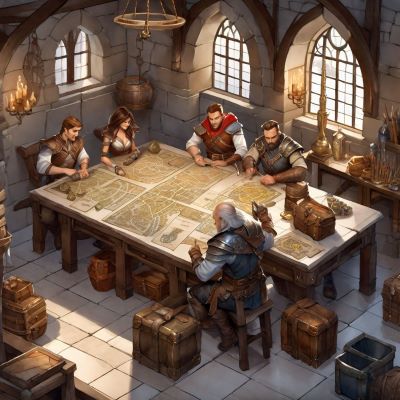Teamwork and resilience are essential qualities for success in both the adventures of Dungeons and Dragons (D&D) and the challenging world of business. Sources of inspiration include the grueling Navy SEALs Hell Week, where team resilience is key. We examine the elements of adversity, collaboration, perseverance, and growth that can be emulated through D&D gameplay.
On another note, the featured image on todays post is a miniature diorama by the talented James Poxon.
Creating an Adversarial Environment
D&D adventures can be designed to introduce challenges and obstacles that push players to their limits. By crafting scenarios that test their problem-solving abilities, strategic thinking, and emotional resilience, the DM can create a simulated environment of adversity. This can be as simple as rolling dice in the open. Letting players know that the danger they are facing is not being fudged by the DM. Additionally making scenarios that are genuinely hard, with significant in-world consequences ramp up the adversity and pressure. Navy SEALs and other special forces teams undergo rigorous training to prepare for real-world challenges. Similarly, D&D allows teams to face adversity in a controlled and collaborative setting.
Teamwork and Collaboration
D&D is inherently a cooperative game, requiring players to work together as a team to overcome challenges. Team members must communicate effectively, leverage each other’s strengths, and collaborate to achieve shared goals. The simulated team adversity in D&D provides an opportunity for teams in the business world to practice and refine their collaborative skills. With the additional benefit of fostering a culture of effective teamwork and synergy.
Perseverance and Grit
Adversity often tests an individual’s perseverance and resilience. In D&D, players experience setbacks, encounter formidable foes, and face unexpected obstacles. By persevering through these challenges, players develop a sense of grit—a combination of passion, resilience, and determination. Emulating the Navy SEALs Hell Week, where candidates push through physical and mental barriers, D&D allows teams to practice and cultivate the perseverance and grit necessary to overcome adversity in the business world.
Problem-Solving and Creative Thinking
D&D requires players to think critically and creatively to navigate complex situations. In the face of adversity, players must analyze problems, explore innovative solutions, and adapt their strategies. The simulated team adversity in D&D provides a platform for teams to sharpen their problem-solving and creative thinking skills, enabling them to approach real-world business challenges with ingenuity and adaptability.
Growth and Learning from Failure
Failure is an integral part of both D&D and the business world. In D&D, setbacks and failures serve as opportunities for growth and learning. Similarly, in business, failures can be powerful teachers if embraced with the right mindset. Through the simulated team adversity in D&D, teams develop the resilience to learn from failure, adapt their strategies, and continuously improve. This growth mindset fosters innovation, adaptability, and a culture of learning within the business environment.

Building Trust and Camaraderie
Team adversity in D&D provides a platform for teams to build trust and camaraderie. Just as Navy SEALs forge unbreakable bonds during Hell Week, D&D enables teams to develop trust through shared challenges, mutual support, and reliance on one another. This trust and camaraderie transfer to the business world, fostering strong relationships, effective collaboration, and a sense of unity within the team.
Final Thoughts on Team Resilience
D&D offers a unique opportunity to simulate team adversity, providing teams with invaluable experiences and lessons that strengthen their resilience. By creating an adversarial environment and fostering teamwork, teams can harness the game to prepare for and overcome the challenges they face. Through this immersive and transformative experience, teams can emerge stronger and more cohesive. Ultimately, better equipped to thrive in the dynamic and demanding business landscape.
I have built a framework for a scenario experience that could be used for your team. To learn more check it out here.



